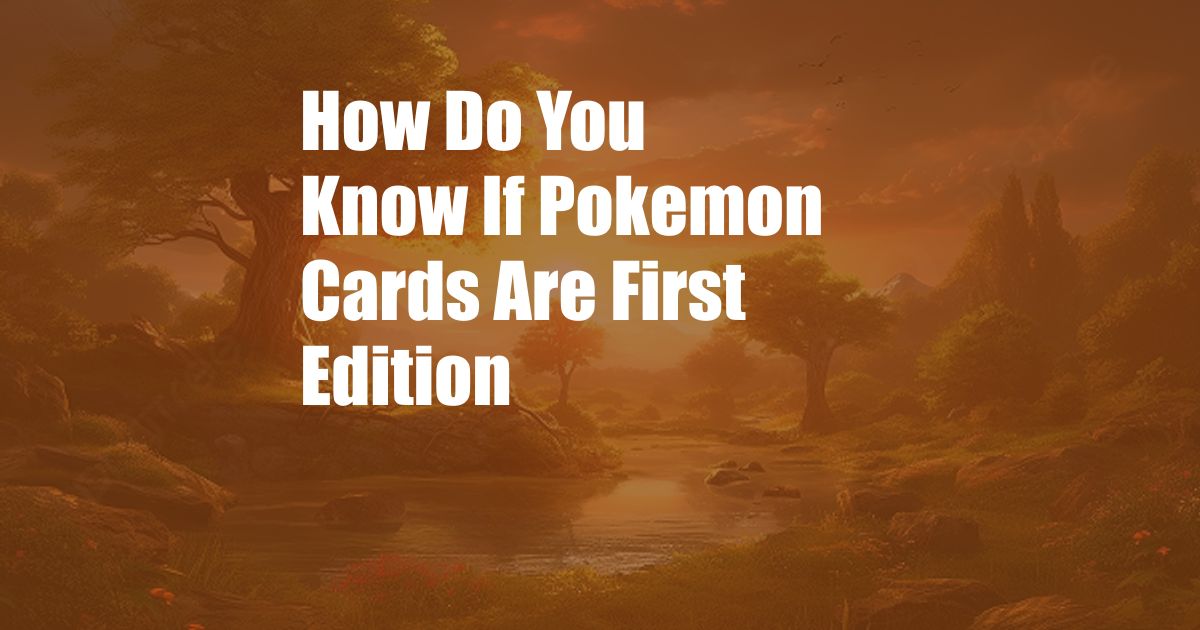
How to Identify First Edition Pokémon Cards
As a lifelong Pokémon enthusiast, I have always been fascinated by the vibrant and intricate designs of Pokémon cards. But beyond their aesthetic appeal, these cards hold a deeper significance, especially for collectors. First edition Pokémon cards, in particular, are highly sought after, not only for their rarity but also for their historical value. In this comprehensive guide, I will delve into the definitive characteristics that distinguish first edition Pokémon cards from their subsequent prints.
First edition Pokémon cards, released in 1999, marked the beginning of a cultural phenomenon. These highly coveted collectibles offer a nostalgic glimpse into the dawn of the Pokémon franchise. Identifying first edition cards is crucial for collectors, as their value can be significantly higher than later prints.
Distinguishing Features of First Edition Pokémon Cards
The most prominent identifying feature of first edition Pokémon cards is the “1st Edition” stamp located in the bottom left corner of the card, below the Pokémon’s HP (hit points) and weakness. This stamp serves as an irrefutable indicator of the card’s first edition status. Other distinctive characteristics include:
- Shadowless Border: First edition Pokémon cards lack the shadow border around the card’s artwork, which was introduced in later prints.
- Darker Colors: The colors on first edition cards tend to be darker and more saturated, giving them a bolder and more vibrant appearance.
- Thick Card Stock: First edition cards are printed on thicker card stock compared to subsequent prints, resulting in a more substantial feel.
- Copyright Date: The copyright date on the bottom of the card should read “1999 Wizards.” Cards with a later copyright date are not first editions.
Value and Significance of First Edition Pokémon Cards
The value of first edition Pokémon cards varies depending on their condition, rarity, and popularity. Some cards, such as Charizard or Pikachu, command higher prices due to their iconic status. First edition cards in mint condition can fetch thousands of dollars, making them highly sought after by collectors and investors alike.
Beyond their monetary value, first edition Pokémon cards hold sentimental and historical significance. They represent the genesis of a beloved franchise that has captivated generations. For collectors, owning a first edition card is a tangible connection to the origins of Pokémon.
Tips for Identifying First Edition Pokémon Cards
Here are some expert tips to assist you in identifying first edition Pokémon cards:
- Examine the Corner Stamp: The “1st Edition” stamp in the bottom left corner is the most definitive indicator.
- Inspect the Border: Look for the absence of a shadow border around the card’s artwork.
- Check the Card Stock: First edition cards are printed on thicker card stock, so they feel more substantial.
- Verify the Copyright Date: The copyright date should read “1999 Wizards.” Later copyright dates indicate subsequent prints.
- Consult Reliable Sources: If you are unsure about a card’s authenticity, refer to reputable sources such as online databases or collector forums.
FAQ on Identifying First Edition Pokémon Cards
Q: How can I tell the difference between a shadowless first edition and a shadowless reprint?
A: Shadowless reprints do not have the “1st Edition” stamp and will have a copyright date later than 1999.
Q: What is the rarest first edition Pokémon card?
A: The rarest first edition Pokémon card is widely considered to be the Charizard Holo, which is extremely valuable and sought after by collectors.
Q: Can I get a first edition Pokémon card graded?
A: Yes, you can submit your first edition Pokémon cards to professional grading companies who will assess their condition and assign a grade based on a scale.
Conclusion
Identifying first edition Pokémon cards is crucial for collectors and enthusiasts. By carefully examining the distinguishing features outlined in this guide, you can confidently determine the authenticity and value of your cards. Whether you are a seasoned collector or a budding Pokémon fan, understanding how to identify first edition cards will enhance your appreciation for these iconic pieces of nostalgia.
Are you ready to embark on your Pokémon card collecting journey and uncover the treasures that await? Let the search for first edition cards begin!